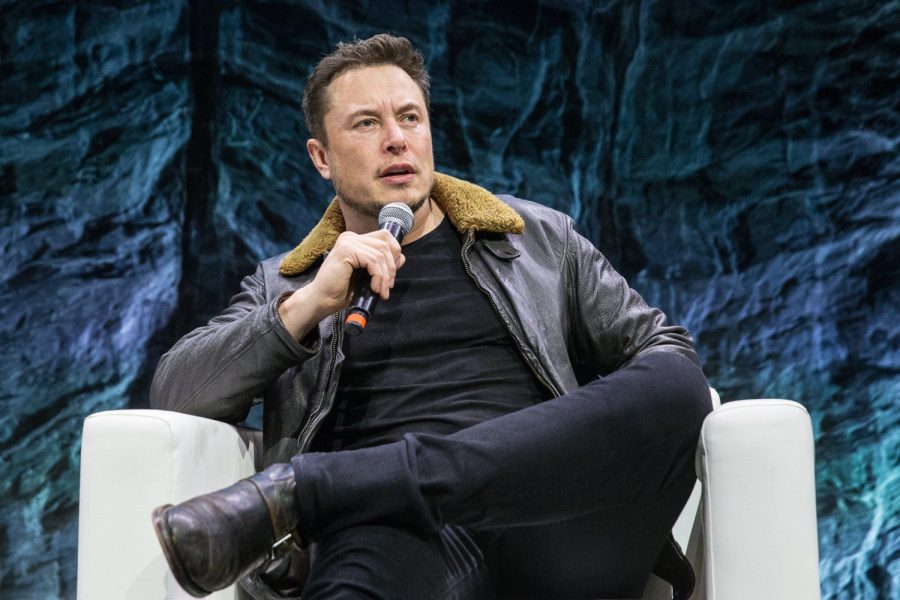Opinion | Billionaires aren’t going to save us
Ending tax loopholes and a wealth tax would generate massive revenue for social programs.
Suzanne Cordeiro/Special to Amer
Elon Musk, CEO of Tesla and SpaceX, speaks during a South by Southwest panel in Austin in 2018. SpaceX is planning a rocket engine production facility near Waco, Musk said on social media Saturday. Musk
November 9, 2022
Billionaires have too much money — and too much power.
While some billionaires donate to philanthropy, their contributions are far less than the money that could go into social programs if they paid their taxes.
Closing tax loopholes would improve income inequality in the U.S. more than the “generosity” of billionaires.
Philanthropy is not inherently a bad thing. However, philanthropy is often done not out of generosity so much as it is to cover the negative impacts the wealthy have.
Billionaires will often use philanthropy to polish their public image. In many cases, the amount of money they donate is significantly less than the amounts of taxes they are dodging.
In February 2020, Founder and then-CEO of Amazon, Jeff Bezos pledged $10 billion to fight climate change, which is 7-8 percent of his wealth.
If you only saw a headline that Bezos was donating $10 billion to fight climate change, you may instantly think that he’s a selfless hero. But there is more than meets the eye to this donation.
Amazon is notorious for avoiding taxes. In 2021 alone, Amazon successfully dodged over $5 billion in taxes, paying only 6 percent of the profits in corporate income tax, cites the Institution of Taxation and Economic Policy. Had Amazon not received any tax breaks, they would have paid $7.3 billion, or 21 percent.
In 2021, Bezos promised to donate $12 billion, or 8 percent of his net worth. Instead, he donated $1.5 billion — less than one percent.
In November of last year, business magnate and investor Elon Musk, tweeted that if the U.N. World Food Program could provide him with a plan to help end world hunger, he would cover the $6 billion price tag by selling Tesla stock.
The WFP published a detailed plan on exactly where the funds would be allocated. As of February, the WFP confirmed they hadn’t received a check from Musk.
There is no reason anyone should be able to casually spend $44 billion dollars when we have 500,000 people sleeping on the streets every night. A wealth tax would still allow wealthy people to enjoy the luxuries of wealth while ensuring that no one is too poor to live.
A wealth tax would generate massive amounts of revenue for social programs. An Ultra-Millionaires Tax proposed by Sen. Elizabeth Warren (D-MA) during her 2020 presidential campaign would tax two cents out of every dollar of net worth above $50 million and 6 cents out of every dollar of net worth above $1 billion. This small tax would generate over $3 trillion dollars over ten years.
Over 11 percent of Iowans live in poverty, according to the U.S. Census Bureau. The spotlight on Poverty and Opportunity, a non-partisan data base on poverty, states 20 percent of jobs in Iowa are low wage. The programs that a wealth tax would fund could lift thousands of Iowans out of poverty.
Opponents of a wealth tax may argue that it is unfair to tax people just for being rich, but a wealth tax would mean rich people can’t be rich. It would allow rich people to enjoy the luxuries of wealth while ensuring that no one is too poor to live.
Iowans have the power to determine their own future. Better social policy is possible, but it will require mass organization and mobilization, strong voter turnout, and the election of lawmakers who support popular policy. It will not be easy, but it will undoubtedly be worth it.
Columns reflect the opinions of the authors and are not necessarily those of the Editorial Board, The Daily Iowan, or other organizations in which the author may be involved.



